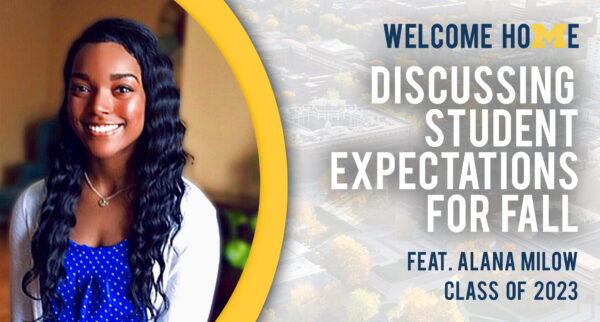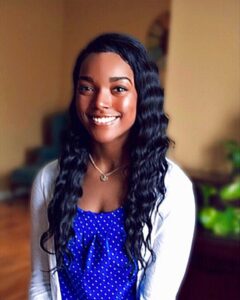Michigan sophomore Alana Milow discusses her ideal fall semester, COVID apprehension, and how she wants to help build a Wolverine culture of care.
Interview conducted by Grant Floto
#UMSocial Intern and University Of Michigan Class of 2020
My name is Alana Milow. I’m a rising sophomore in the School of Kinesiology. I’m majoring in Sport Management and I am involved in the Sport Business Association and the Kinesiology fraternity, Phi Epsilon Kappa.
Q: You have your freshman year under your belt. What are you feeling as you approach the start of your sophomore year and how do you anticipate dealing with such a different fall start?
For sure. So I think that the main feeling is some apprehension. I think that’s kind of a mood across the world, definitely though with college students. It just kind of comes with how uncertain everything is. I think we’ve seen how things have started to try to go back to normal.
“The main way we’re going to have to approach things to have a good semester is by keeping an open mind and sort of adapting to things as they come.”
It’s not going to be how it has been in the past and that’s kind of a given. So just kind of going with the flow for the most part and taking things as they come.
Q: What do you hope to see from your fellow Wolverines and what sort of advice would you give?
I definitely hope to see some guideline following, for sure. I think that across the board, people have been saying young people are kind of the ones straying away from doing what we’re supposed to be doing. And I think at U-M, we all know better, you know what I mean? So I definitely have high expectations and I think that most people are going to do the right thing. Nobody wants to get sick. Nobody wants to get anybody else sick. So as far as that goes, I think people will hopefully want to do the right thing.
A big part of U-M’s culture, though, is the social aspect. And that is tied into football games and Greek life and things like that. As much as we want those things to still be a part of our experience, I think something that all of us students are going to have to kind of come to terms with at one point or another is it can’t be the way it was. I’m hoping that all of us can kind of deal with that in a safe way, not sort of learn from our mistakes, but be proactive.
Q: Do you plan on going back to campus next month? And if so, where are you living or how does that look for you right now?
So as of right now, nothing is finalized, but it doesn’t look like I will be back in Ann Arbor, at least for fall semester. I think everything for winter semester is still very much up in the air for everybody, so not really sure. Haven’t even thought that far, really, to be honest with you.
But last fall, I did sign a lease to live in an apartment for this upcoming year. And contractually, I am still in that lease, so that is something else that has to be tackled. But, the decision-making for me deciding that I probably won’t be going back is, for starters, all of my classes are online, so everything is going to be remote for me anyway. And going along with that, I think everyone knows that rent in Ann Arbor is not cheap. I mean, if we just want to be on the basic level, it just kind of seems like a waste of money.
Going beyond that, though—which is the real deciding factor, because I would be willing to pay money to be on campus, and to be around my friends, and be close to the resources that I think I need to be successful in Ann Arbor—it felt like not only an unnecessary health risk for myself, but everyone around me. Whether you want to think about it like this or not, every additional body in a space is that much more of a risk of the spread of the virus. It doesn’t matter how safe you are. There’s certain things that are just out of your control. There’s no way to tell who has it and who doesn’t when you’re just looking at somebody for the most part.
So, I think that with everything starting to reopen, it’s been very important for things to maintain the sense of what’s essential and what’s not. My presence on campus isn’t essential because I don’t have any classes. Most of my orgs and different obligations probably will be virtual anyway, and I live close enough to campus to commute if necessary for certain events. But it felt like I’m just that much more of a chance of someone getting the virus really is how it came down to it for me. So, I’m deciding to stay home, I’m pretty sure, just to do what I can to keep everyone else safe, and then myself, too.
Q: Are you more concerned about your hybrid class format and remote classes or are you more concerned about the social aspect that you mentioned?
Definitely the social aspect. For me personally, all of my classes are remote. And so doing the hybrid option, although that is definitely a risk, it doesn’t really apply to me. And I do think with the hybrid as much, even though every time we go out into public, that’s a risk within itself. I think that classrooms are probably going to be one of the safest places on campus, just because there will be so much attention on making sure that those spaces are clean and people within those spaces will be following guidelines. But once people leave those buildings, they’re kind of up to their own devices. And I think we see that no matter how much we try to push people toward doing the right thing, it’s really up to them.
I definitely think the social aspect is going to be where people need to stay strong, sort of, it’s easy to wear a mask when you are going to a building where everyone else is wearing a mask, but if you’re at a house and 10 of your friends are there, your guards come down and you might think that it’s not as big of a deal there, but we have to stay strong and make sure we are taking the measures we should be taking at all times.
Q: Are there any things that you think U-M has done well in terms of promoting coming back to campus or are there things that you think the university should start doing with August and September approaching?
I think that the university has done a really good job of maintaining a positive attitude. So as far as emails go, that’s been the main communication, at least that I’ve received from the university when it comes to plans and things like that. They seem very cautiously optimistic about how the semester can be carried out and they seem to be exuding a sense of confidence with their ability to keep people safe. I think that’s very appreciated because the tone is set from the top.
If they were panicked and worried, I think that would definitely sort of trickle down into students and their behaviors. What I would like to see more, and I think I can speak for at least the people that I’ve spoken to, my fellow students and things like that, is more clarity as far as what things would look like. Again, so much is unknown, and so it’s really hard to be definitive saying, “This is exactly how things are going to go,” when we really have no idea how things will go.
But as far as the enforcement of guidelines and things like that, we haven’t really gotten much information on how that will be carried out. Will there be punishment if people choose not to wear a mask? Will there be punishment if people choose not to social distance? Will there be a way to trace students who have symptoms to make sure that, maybe seven days after they report symptoms, they start to feel okay or things like that? Just making sure that everybody is being accounted for, because when things start to slip through the cracks, that’s when things can get bad and get out of hand really fast. So I definitely think a little more communication about how they plan to enforce guidelines would be appreciated.
Q: Are your feelings of apprehension more geared toward your safety or the uncertainty of what is to come?
Definitely a combination. I think the feeling of safeness, if I can put it that way, is inherent to the situation. It’s almost a consistent level of risk and then that risk can increase or decrease depending on the precautions that are being taken. But as far as not knowing what it was going to look like, I think if we had a little bit more information, which I’m hoping will come out within the next week or so as the start of classes gets closer. When we get more information, I think that’ll definitely ease some people’s nerves as far as okay, what exactly will the risk level be?
Q: In your perfect world, what do you think this semester would look like?
So, the perfect world would be a world where we can safely go to class and everyone is following guidelines. As far as the social aspect goes, I think the university used this term in their original plan, but sort of having your nuclear family unit of the people you would be living with. All of us would maintain our unit and not really spread. That way at home or your dorm or wherever you’re living, you were safe there as well. Everyone would be able to track and account for the people in their circle when it comes to safety and symptoms and following guidelines.
And there would still be football season for sure, but safely of course.
Q: What would you say are some of the things that you’ve been missing the most since you left campus or some of the things that you’re most excited about?
Definitely sports. I think that’s a big culture on campus and so that’s definitely been missing and I think that’s something that everyone wants and is kind of looking forward to. I think all of us are kind of like, “Eh, is it going to happen? Is it not?” But it’s definitely something that we want. And then also the in-person relationships. I felt this very heavily when we made the transition to online spring semester.
What I mean by that is the relationships you have with your professors and your advisors and your classmates online is very different then when you’re in a classroom or an office with them, one on one. And so really making sure that you have those lines of communication still was an adjustment for sure. I think that this upcoming semester, I would definitely be trying to maintain virtual or distance appointments.
Q: Thank you again for doing this. We really appreciate all of your super-thoughtful answers and your honesty. Good luck with sophomore year!
Of course. Thank you so much. Thanks for having me.




